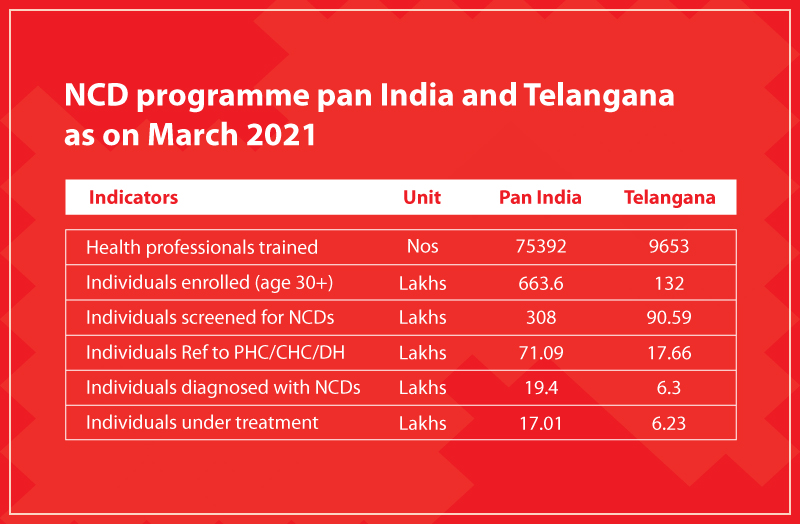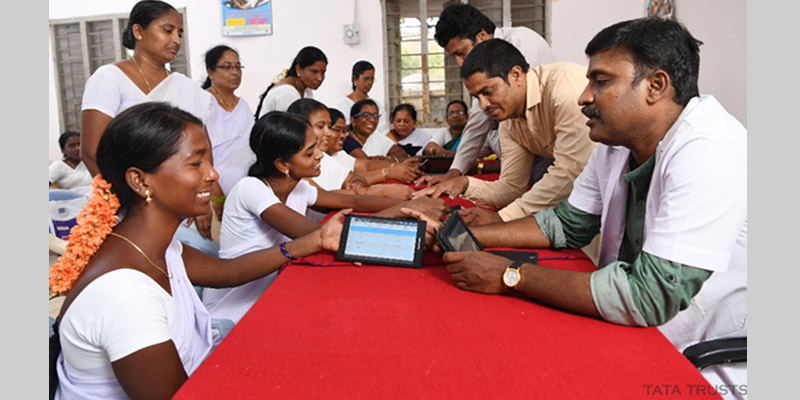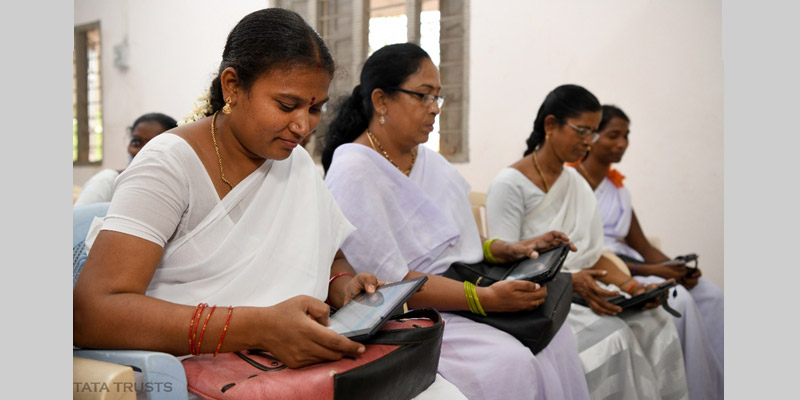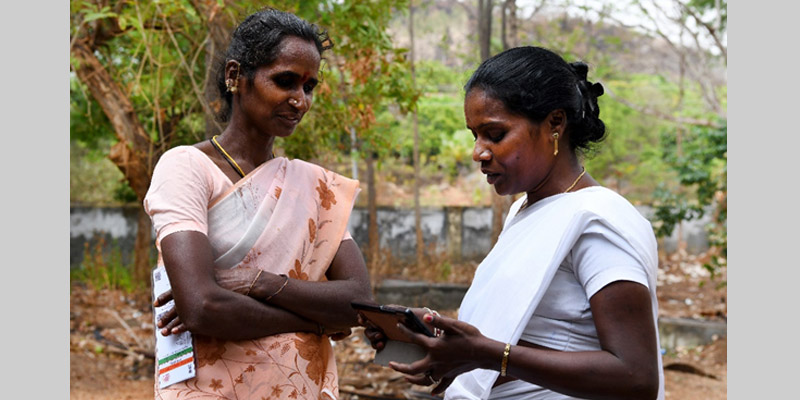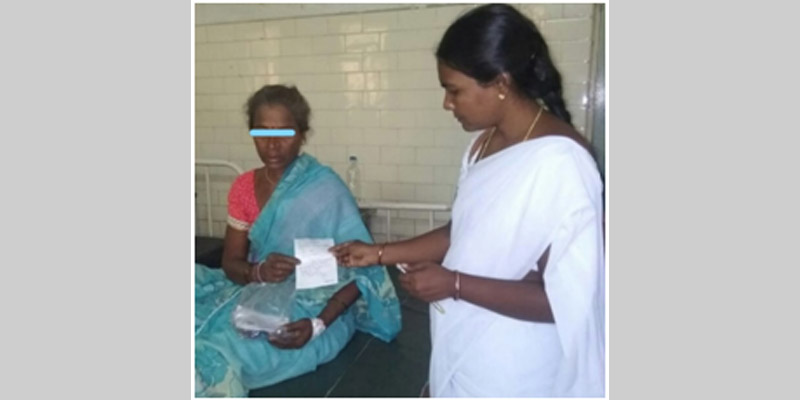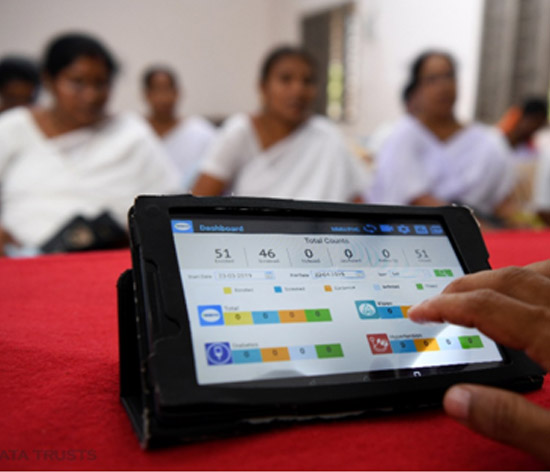
Non-communicable diseases (NCDs) are those which are not transmissible from one person to another. They develop at a slow pace and are longer in duration. With rapid changes in lifestyle and degrading environmental conditions, deaths due to NCDs are on a rise. In fact, NCDs account for 70% of all deaths worldwide (WHO, 2018).
Taking cognisance of the impending challenge, the government has demonstrated its keenness, not just in curative, but preventive medicine as well. Dr. Sitarama Budaraju, Clinical Lead - Health, Tata Trusts, explains, “At a policy and implementation level, the Ministry of Health and Family Welfare launched the National Programme for prevention & Control of Cancer, Diabetes, Cardiovascular Diseases & Stroke (NPCDCS), as a part of its National Health Mission. As a part of its NCD programme, a population-level screening for early detection and management of ailments has been initiated.” The Tata Trusts is playing an important role in NCD screening in 526 districts across 28 states and union territories which are in advanced stage of implementation.
“The primary goal of this programme is the screening of at least 20 crore adults above the age of 30 years for identified NCDs, and linking them to the appropriate higher levels of health care facilities for necessary care. It is estimated that the project will help identify around 1 crore new NCD patients”, adds Dr. Sitarama.
Screenings for NCDs were initiated across Telangana in the year 2017, and till date, over three million citizens in the 30+ years age bracket have been screened. Apart from identifying close to two lakh hypertension and diabetic patients in Telangana, a few patients suspected of having cancer, were also screened.
The NCD programme uses the NCD-GoI application for data collection, screening and referrals. The technology solutions for this programme are provided by Dell. While Tata Trusts is providing the field monitoring support and programme management for effective implementation and delivery, the Auxiliary Nurse Midwives (ANMs – the village-level women health workers, who act as the interface between communities and health services) facilitate data collection and the screening processes. ANMs are trained by Tata Trusts on operating the application for individuals and for the opportunistic screening of the population.
Ms. I. Padma, aged 40, hailing from Old Mancherial, was one of the patients identified during the NCD screening programme. Despite having clear symptoms of malignancy of breast cancer, she was quite unaware of her condition. She was also reluctant to approach a doctor for treatment. Ms. Geetha, an ANM at the Urban Health Centre of ward 26, SC Old Mancherial, screened Ms. Padma for NCD. The patient had reportedly been carrying a malignancy for about six months, when she was screened. Geetha, who was trained under the programme for operating the application and opportunistic screening, entered the screening results into the NCD-GoI application.
Counselling helped
In the review of the screening results, Ms. Padma was referred to the Area hospital, Mancherial on May 30, 2019 by the medical officer, UPHC Old Mancherial. On learning this, Mr. Vamshi Krishna, IT Consultant, Tata Trusts and his colleagues, considering the stage of her malignancy, arrived at a decision to shift the patient immediately to MNJ Cancer hospital, Hyderabad. The patient had no one to look after her and because of this, was reluctant to go to Hyderabad to undergo any treatment. After extensive counselling and assurance by the NCD programme executives, she finally agreed to go to Hyderabad for treatment.
Diagnosis and treatment
The Patient Care Coordinators at Tata Trusts took Ms. Padma to Dr. Sanjeeva Kumari, Radiation Oncologist at MNJ Cancer Hospital. While blood tests and a CT scan were conducted at the hospital premises, a 2-D echocardiogram and ECG tests were conducted at the Osmania General Hospital. A bone scan was also scheduled towards the end of the month.
Even though the patient had no documents apart from her Aadhaar card, her registration and admission process was processed smoothly. Her welfare was prioritised without any procedural hindrance.
On completion of the prescribed tests, acquaintances of the patient were approached under the guidance of social workers from the Department of Pain and Palliative care at the MNJ Hospital, to proceed with the necessary treatment. Anticancer treatment was initiated in May 2019, and the patient has been attending review clinics since her discharge from the hospital. She has also received diligent support from Tata Trusts coordinators and palliative care team members in matters of counselling, appointment-booking, regular reminders and rehabilitation. As on date, her condition has improved significantly, and she leads a pain-free life. The doctors, authorities and the staff at MNJ Hospital were extremely cooperative with her and held the NCD programme in high regard.
The Tata Trusts is playing an important role in NCD screening in the state. The regional team is supporting the Health Department personnel in troubleshooting, digitisation of NCD records, training around 5,000 field staff (including ANMs & medical officers), and providing data support. This is in addition to the programme implementation support extended to the state – ranging from gathering camp observations and field feedback to facilitating the care continuum of patients. It is a satisfying moment for the team, and paves the way to extend such support to many more patients who are wary of going to Hyderabad or a cancer hospital without any support or guidance.
Several patients are diagnosed with ailments under the NCD screening programme. The manner in which the NCD programme machinery handles challenges such as these, stands testimony to the fact that it is indeed possible – not just to prevent the progression of diseases, but to also ensure last mile delivery of institutional health care. The fact that sincere attempts are being made to ensure no individual is left to fend for themselves, and that the state shall support them in leading a healthy life, paints an optimistic future of a healthy and prosperous India.
